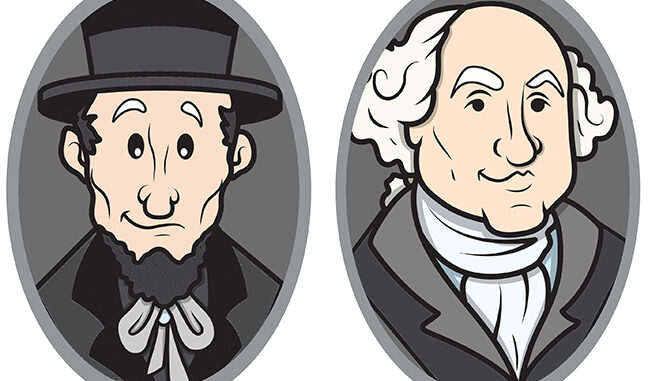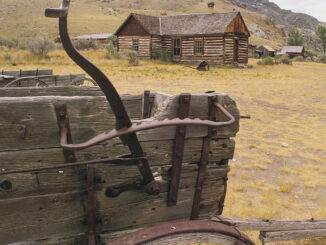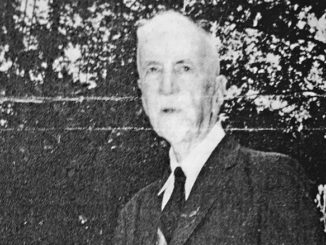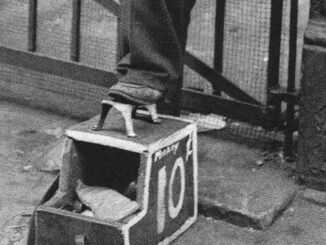
FEBRUARY – the month of the violet flower and the amethyst birthstone, National Heart Month which includes its “love” celebration at Valentine’s Day and its Black History recognitions. This month also presents Groundhog Day (2nd), Rosa Parks Day (4th), Ronald Reagan Day (6th), Susan B. Anthony Day (15th) and a host of other worthy concerns designed by special interests (the Super Bowl and even National Tater Tot Day). In the early years of this community’s existence, few days were marked for celebrations, but as the city and nation grew, the list of special days grew. All these features deserve our respect but let us turn our attention for the next few moments to the celebration of our nation’s past leaders… Washington, Lincoln and the Presidents’ Day celebration.
After the flurry of events of year 2020 and early 2021, it is refreshing to revisit past leaders and the vision, sacrifices and accomplishments in the early years of our nation’s history. One delightful book to aid us in this adventure is one written by Jon Meacham and Tim McGraw entitled “Songs of America.” I rarely recommend a book to others because reading is such a personal choice, but reading only the first two sections of the book made me so proud to be an American – it renewed my faith in our country. For years I have been fascinated with the power of music to inspire and unite groups of people. It provides memory, comfort and purpose to individuals. In this book, the authors take us on a journey through the events in the forming and establishing this great nation of ours and the role music played in influencing events and how events influenced our music.
“Songs of America” is not a boring history book. The writers make you feel you are walking beside them, sharing with you intimate details from the writings and words of the people living in the time. On page four of the book you will read:
“Such is the sounds of our history… a story of promises made and broken of reform and reaction – a story fundamentally shaped by the perennial struggle between what Abraham Lincoln called ‘the better angels of our nature’ and our worst impulses. That’s the stuff of the story of the past which… is never dead: it isn’t even past. Nor is history a fairy tale or a bedtime lullaby… never a once-upon-a-time… never a happily-ever-after. There is… the wonderful American drama of seeking to ensure that hope can overcome fear, that light can triumph over darkness, that we can open our arms rather than clench our fists… And through all the years of strife, we’ve been shaped not only by our words and our deeds but by our music, by the lyrics and the instrumentals that have carried us through the dark days and enabled us to celebrate bright ones.”
During the struggle against Britain for independence of the nation, the first major lyrics appeared entailing the case for independence. “The Liberty Song” appeared eight years before the Declaration of Independence and expressed a familiar sound for us today:
“Then join hand in hand brave Americans all.
By uniting we stand, by dividing we fall:
In so righteous a cause let us hope to succeed
For Heaven approves of each generous deed.” (Pages 9-10)
Throughout the War for Independence, early songs of the battlemen became broadly popular. “Yankee Doodle Dandy,” with its lively rhythm, and “The Pennsylvania Song” made it possible to capture the strength of unity and the bolstering of the spirit. The events soon gave rise to a desire for a new era in government. As one proceeds through the pages, the reader feels an intimate relationship to the early leaders in their deliberations. Once independence was obtained came the worry of “the sacred fire of liberty” (as described by George Washington) and all it required.
The price of liberty brought forth politics – that which allows different, often divergent views, but the idea of liberty was believed to prevail over division and party lines. The song, “Hail Columbia” appeared in 1798 including the lines: “Firm, united let us be. Rallying around our Liberty.” For years, until 1931, this song was believed to be the national anthem, Events at the battle of Fort McHenry in Maryland on September 13 and 14, 1814 brought forth “The Star-Spangled Banner.” The song “(was) bold, warlike and majestic: stirring the profoundest emotions of the soul and echoing through its deepest chambers something of the prospective grandeur of a mighty Nation tramping toward the loftiest heights of intellectual dominion.” (Page 40) The nation had a new national anthem. It became officially so in 1931 by act of Congress. “My Country ‘Tis of Thee” soon joined “The Liberty Song,” “Hail, Columbia,” and “The Star-Spangled Banner” as standard bearers of the soul of this young nation and the tie binding its citizens to each other.
“Songs of America” gently leads the reader through era after era of important events and the lyrics that captured the hearts and souls of the moment: slavery with its spirituals of the powerful and the powerless – full of promises that could be felt in the lyrics of “Go Down Moses” and “Swing Low, Sweet Chariot.” There was music of Native Americans expressing their gods, of their great tribe leaders, of joy, loss and dangers. Civil War songs appeared that shaped the thinking and emotions of all players affected by the war scene: “Battle Hymn of the Republic” in 1862 and “I Wish I Was in the Land of Dixie.” Many of these tunes were so well known that it was common for groups to supply their own words to reflect their southern, northern, or cultural identities.
This book of “patriotism, protest and the music that made a nation” by Meacham and McGraw continues to take the reader through the major wars and other major events up to the 1960s. Its wealth of lyrics throughout the ages is priceless with its treasures of emotions and thoughts. Its closing notes, credits and Index make it a most valuable historical resource worthy of the believer of the American way of life.
As Americans experience February 2021, let us be reminded of the glories of our nation, of the struggles that made us, and the victories that challenge us every day. May we continue to find music to guide us and sustain us and enable us to keep true to the ideals of our nation.
-by Mary Alice Oliver
About the Author: Mary Alice Oliver is a Bowling Green native who is a 1950 graduate of Bowling Green High School. She retired from Warren County Schools after 40 years in education. Visiting familiar sites, researching historical records and sharing memories with friends are her passions.







